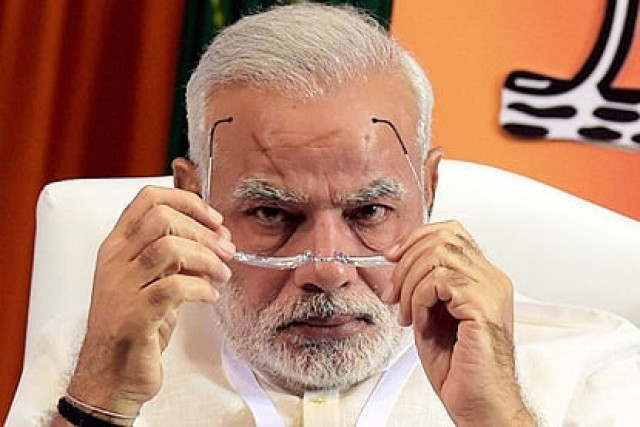Modi: The man behind the anti-Pakistan rhetoric
His reference to Balochistan was clear indication of obsession over Pakistan that he grew up with during his childhood

Modi's reference to Balochistan was clear indication of obsession over Pakistan that he grew up with during his childhood. PHOTO: INDIAN EXPRESS
Vikas Swarup, India’s obedient civil servant and spokesperson of Ministry of External Affairs, also quoted Modi’s remarks at the G-20 summit on Twitter. “Indeed, one single nation in South Asia is spreading these agents of terror in the countries of our region.”
Later, Modi was seen grasping the hands of Brazilian and Chinese presidents in an impolite and undiplomatic manner, probably assuming the act would exhibit his strong personal ties with the duo. At another instance, the camera-addicted leader blocked the way of Egypt’s General Sisi while seeking attention of indifferent Barack Obama. Already, the hilarious memes of his hugs, especially with France’s Francois Hollande, have transformed ‘awkward’ encounters into the new ‘normal’.
Analysis: The grim reality of Pak-Afghan relations
His reference to Balochistan on August 15 was a clear indication of desperation and obsession over Pakistan that the man grew up with during his childhood in Gujrat’s Mehsana district. Groomed after the age of 10 by the Rashtriya Swayamsevak Sangh (RSS) – a vast and influential Hindu revivalist conservative movement that has been banned three times in India – Modi’s first role was to clean office of a local Hindu militant.
Formative years
If there is one country, which has exercised the ‘right to forget’ the most, it is Modi’s India. Albeit the sub judice case of Zakia Jafri, Modi has yet to apologise for the 2002 religious riots in Gujarat that killed nearly 2,000, mostly Muslims, during his tenure as chief minister. Washington and London have both forgotten that they had blacklisted this man till 2005 and 2012, respectively.
“His entire political career is built on 2002. If there were no riots in 2002, Modi would not have won the 2003 elections in Gujarat with the kind of majority he managed,” said journalist Nilanjan Mukhopadhyay, a well-known expert on right wing Hindu politics, in an interview three years ago. Nonetheless, he never became a political pariah like Jamat ud Dawa’s Hafiz Muhammad Saeed, internally as well as internationally.
Analysis: After Wani, Kashmir on the edge – I
Soaring to the highest elected office following such radical experiences, no one other than the small town RSS activist can better understand the impact of maligning an enemy with allegations of harbouring non-state militant outfits.
Mentored by prominent RSS functionary Murli Manohar Joshi, Modi, the son of a poor tea seller rose so swiftly through the ranks of RSS that another stalwart sought his transfer to the organisation’s political wing, Bharatiya Janata Party (BJP). “It was Advani who mentored Modi when he virtually handpicked him into his team of state apparatchiks after recommendations from a few trusted peers in the late 1980s," records Nilanjan Mukhopadhyay, author of book titled Narendra Modi: The man, the Times.
Man on a mission
With dedication to Hindutva and hard work, the man with humble roots shattered the Nehru-vian persona of a leader when compared to his main adversary, Rahul Gandhi, heir to India’s power dynasty. The 66 year old, who extolled the merits of trickle-down economics through industrialisation, is increasingly falling in the ideological spell of Hindutva while being advised by top RSS comrades. Backed by enormous corporate wealth and RSS zealots, Modi is riding the wave of populism and charisma courtesy an aggressive, tech-savvy campaign; he debuted holograms on the campaign trail.
India’s political icon of today fancies silk clothing, thin-rimmed glasses and more recently designer English suits. Even while holding the prime ministerial office, the man has sought the help of tutors to polish his spoken English.
Three years into the Prime Minister Office and whispers of his financial wrongdoing, especially closeness with billionaire Mukesh Ambani, echo in frank café discussions and newspaper columns. However, there is no concrete, undeniable evidence yet.
Since today’s ‘NaMo’ has proven to be a quick-learner and shrewd gambler, the RSS lobby doesn’t let his decisions go unchecked. The trickiest question remains: Ideological baggage notwithstanding, will he be entirely his own man one day?
Indian political analysts often contend that Modi is a totalitarian leader who accepts nothing less than ultimate allegiance. His persuasive and self-indulgent body language divulges a similar expectation from countries friendly to India. For sure, international politics is not averse to such loyalty. Thus, Modi may have to rely on Chanakya Kautilya’s treatise if not Niccolò Machiavelli’s sagacity. Except for superannuated Hamid Karzai, the Indian supremo found no subscribers to his Balochistan rambling.
Naveed Ahmad is a Pakistani investigative journalist and academic with extensive reporting experience in the Middle East and North Africa. He is based in Doha and Istanbul. He tweets @naveed360



















COMMENTS
Comments are moderated and generally will be posted if they are on-topic and not abusive.
For more information, please see our Comments FAQ